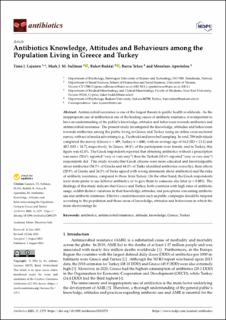| dc.description.abstract | Antimicrobial resistance is one of the largest threats to public health worldwide. As the inappropriate use of antibiotics is one of the leading causes of antibiotic resistance, it is important to have an understanding of the public’s knowledge, attitudes and behaviours towards antibiotics and antimicrobial resistance. The present study investigated the knowledge, attitudes and behaviours towards antibiotics among the public living in Greece and Turkey using an online cross-sectional survey, with social media advertising (e.g., Facebook) and snowball sampling. In total, 709 individuals completed the survey (Greece n = 309, Turkey n = 400), with an average age of 34.2 (SD = 13.1) and 40.5 (SD = 14.7), respectively. In Greece, 49.4% of the participants were female, and in Turkey, this figure was 62.4%. The Greek respondents reported that obtaining antibiotics without a prescription was easier (52.6% reported “easy or very easy”) than the Turkish (35.6% reported “easy or very easy”) respondents did. This study reveals that Greek citizens were more educated and knowledgeable about antibiotics (58.5% of Greeks and 44.2% of Turks identified antibiotics correctly), their effects (20.9% of Greeks and 26.3% of Turks agreed with wrong statements about antibiotics) and the risks of antibiotic resistance, compared to those from Turkey. On the other hand, the Greek respondents were more prone to use leftover antibiotics or to give them to someone else later (p < 0.001). The findings of this study indicate that Greece and Turkey, both countries with high rates of antibiotic usage, exhibit distinct variations in their knowledge, attitudes, and perceptions concerning antibiotic use and antibiotic resistance. Effective countermeasures such as public campaigns should be targeted according to the population and those areas of knowledge, attitudes and behaviours in which the main shortcomings lie. | en_US |

